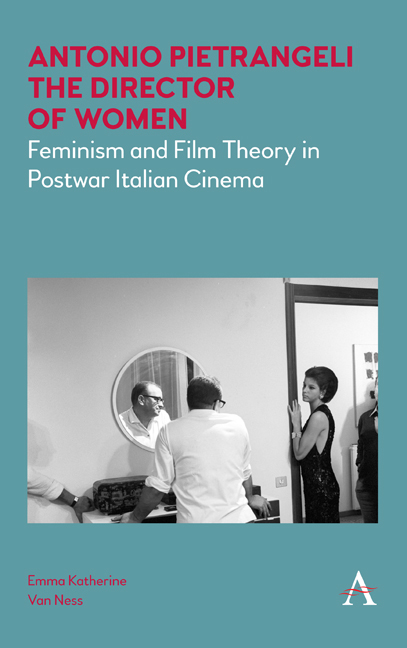Book contents
- Frontmatter
- Dedication
- Contents
- List of Illustrations
- Acknowledgments
- Vita
- Introduction: Antonio Pietrangeli, A Brief History
- Chapter 1 Pietrangelian Film Theory: From Neorealism to Feminism
- Chapter 2 Maid from the Margins: Il sole negli occhi
- Chapter 3 The Coming of Age of a Teenage Bride: Nata di marzo
- Chapter 4 Legally Bound: Political Realism and Prostitution in Adua e le compagne
- Chapter 5 Fantasmi a Roma: Sur-Realism and the Time-Image
- Chapter 6 The Dora Problem: La parmigiana, Piatti, Pietrangeli and Freud
- Chapter 7 Too Much Woman: Marriage, Power, and Excess in La visita
- Chapter 8 Breaking Faith: Il magnifico cornuto, Envy and the Crisis of Vision
- Chapter 9 Io la conoscevo bene … Or did I? Antonio Pietrangeli, the Author and the Actress
- Conclusion: Antonio Pietrangeli, Feminism and Film Theory
- Bibliography
- Index
Introduction: Antonio Pietrangeli, A Brief History
Published online by Cambridge University Press: 06 May 2020
- Frontmatter
- Dedication
- Contents
- List of Illustrations
- Acknowledgments
- Vita
- Introduction: Antonio Pietrangeli, A Brief History
- Chapter 1 Pietrangelian Film Theory: From Neorealism to Feminism
- Chapter 2 Maid from the Margins: Il sole negli occhi
- Chapter 3 The Coming of Age of a Teenage Bride: Nata di marzo
- Chapter 4 Legally Bound: Political Realism and Prostitution in Adua e le compagne
- Chapter 5 Fantasmi a Roma: Sur-Realism and the Time-Image
- Chapter 6 The Dora Problem: La parmigiana, Piatti, Pietrangeli and Freud
- Chapter 7 Too Much Woman: Marriage, Power, and Excess in La visita
- Chapter 8 Breaking Faith: Il magnifico cornuto, Envy and the Crisis of Vision
- Chapter 9 Io la conoscevo bene … Or did I? Antonio Pietrangeli, the Author and the Actress
- Conclusion: Antonio Pietrangeli, Feminism and Film Theory
- Bibliography
- Index
Summary
The Director of Women but Never a Feminist
It became obvious to me that men don't live through female characters.
— Meryl Streep in an NPR interview with Terry GrossIt may seem out of step to begin the study of a fifties and sixties Italian filmmaker with a quote from a contemporary American actress, but the point that Streep makes is key to understanding the difficulties in dealing with Antonio Pietrangeli's films from a historical and critical point of view. The scope of this study will be to show that Pietrangeli, in both his film theory that I will touch on in this theoretical introduction to the director's own critical writings on cinema and in his film praxis that I will discuss in the following chapters, is engaging with a wide variety of feminist and film theory ante litteram, before it became part of the mainstream discourse or moved fully into the cultural zeitgeist. This operation will shed light on the importance of Pietrangeli's films and why they should be more widely studied and available to English-language audiences. The dearth of critical engagement with Pietrangeli's films is partially due to the difficulty in accessing copies of his films since many, including Nata di marzo and La parmigiana, are out of print, and many others available only in Italy, with Italian subtitles. Many are poorly dubbed in English, or are simply difficult to come by, due in part to Pietrangeli's cross-genre productions; while associated with both neorealism and commedia all’italiana (Italian-style comedy of the fifties and sixties), Pietrangeli's cinematic theory and his films defy representational conventions when it comes to psychology and sexual difference, placing his productions at the intersections of auteur and nouvelle-vague genres as well. Consequently, Pietrangeli offers us unique opportunities as film scholars; we will be able to use his own theories of film against him in order to see to what extent his films live up to his own criticism, especially in the areas of female-and male-gendered subjectivity, the psychology of difference, spectator studies and apparatus theory. Streep's quote serves as evidence of the fact that, still today, these remain pressing issues, especially at a moment when the #MeToo movement has sparked dialogue about the ubiquity of sexual violence from a female perspective.
- Type
- Chapter
- Information
- Antonio Pietrangeli, The Director of WomenFeminism and Film Theory in Postwar Italian Cinema, pp. 1 - 10Publisher: Anthem PressPrint publication year: 2020



